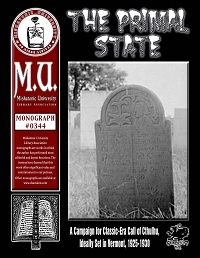Chaosium, Inc., $22
By Jeff Moeller
Reviewed by Matthew Pook
Since 2003, the Miskatonic University Library Association series of monographs has been Chaosium’s way of making other works available to players of both Call of Cthulhu and Basic Role Playing. Bar the printing, each monograph’s author is responsible for the writing, the editing, and the layout, so the quality of the series varies widely. This has led to some dreadful releases. Fortunately, The Primal State is not among those.
Set in second half of the Twenties, this monograph is inspired by H.P. Lovecraft’s own observations of the effects of mechanization and modernization upon the New England state of Vermont. In “Vermont — A First Impression,” Lovecraft described these effects as ugly, tawdry, and commonplace, bemoaning the loss of the region’s “pristine and ancestral beauty.” While modernization makes the primarily rural and forested Green Mountain State increasingly accessible, it also has an insidious effect that the investigators will discover over the course of five years.
The Primal State consists of three scenarios that will take the investigators into Vermont, the three being separated and bookended by parts of a fourth scenario, “The Sap Keeps Running.” This has the investigators stopping each time on the road to buy maple syrup and maple sugar candy from Miss Jeplin, an elderly shopkeeper and amateur expert on Vermont folklore. Each time they visit, Miss Jeplin is yet more unsettled, possibly from Sanity loss, but it could also be just old age and encroaching senility.
The first of the parts in between “The Sap Keeps Running” is “Invitation to the Dance.” In Bennington, several gravestones have been found to have swapped places in a churchyard. The police have it down to schoolboy pranks, but such an odd occurrence is sure to attract the investigators’ attention. With its “vivophiliac” (quite literally the opposite of a necrophiliac) and “witch riding” encounters, the scenario has a strong sexual element that needs mature handling. Problematically, there are no notes on running the scenario without these elements, but nevertheless, given the conservative mores of the period, such elements should shock the investigators.
From Bennington, the campaign shifts to Burlington for “The Beast of Lake Champlain.” Are several deaths due to “Champ,” a serpent creature said to live in the lake? Or were the victims murdered by persons unknown? Other suggestions include a coven of cultists making regular sacrifices, a Colonial-era witch turned serpent, and a crazed serial killer. The Keeper is free to choose. Whatever the choice, the scenario should ideally end in a climax along the wooded shores of the lake as the investigators race to save the next victim.
The last scenario, “Home, Sweet Home,” is the weakest of the three. It ends with the investigators trapped by a curse at a dig site in the Vermont foothills, having gone in search of the site’s archaeological team. This scenario brings a radical change in terms of mood and tone to the campaign, threatening as it does to become a frustrating endurance test for the players as they try to lift the curse.
The Primal State comes to a close with the fourth and final part of “The Sap Keeps Running.” It ends in Miss Jeplin’s death, puzzling inconsistencies and a very nasty encounter in the woods, the groundwork having been laid in the previous parts.
Like any monograph, The Primal State needs a polish here and there, but it includes a wealth of period detail about Vermont, its history and folklore, plus suggested means of getting the investigators involved. Whilst its chronological length allows innumerable scenarios to be run between the ones here, getting the full effect of gaining and then losing Miss Jeplin’s friendship requires plenty of gaming time. Conversely, playing the campaign straight through would lose much of this impact.
Although not quite set there, The Primal State would be a worthy extension to a Lovecraft Country campaign, Arkham being not far away. Let down only by a difficult third scenario, The Primal State is strong in terms of period detail, structure, and theme, and deserves seven phobias as one of the best monographs released to date.
This review appeared in The Eye of Light and Darkness in The Unspeakable Oath 18.
Reviewed items are rated on a scale of one to ten phobias:
1-3: Not worth purchasing.
4-6: An average item with notable flaws; at 6 it’s worth buying.
7-10: Degrees of excellence.

